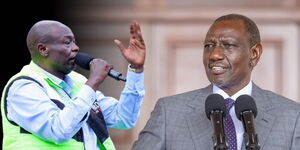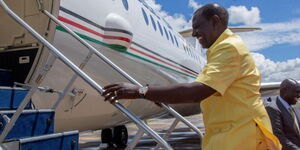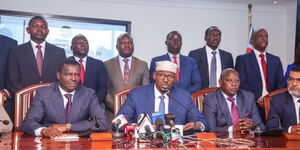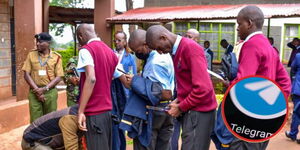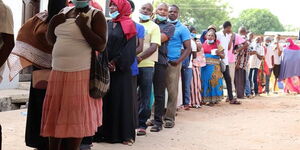The exponential growth of the use of Twitter in Kenya has shaped and transformed how information is consumed by different publics in the social media space. It has become a force to reckon with in the information age and digital age.
But dig deeper into Twitter’s corners, and you’ll find a huge, interconnected, bafflingly popular collection of fan-made parody accounts.
Army of jokers in the virtual world in Kenya has hidden under that cover of anonymity to distort information and make misleading statements, especially from government institutions.
The rise of parodies came during the second term of President Mwai Kibaki where his fake account was used to issue very controversial statements.
Kibaki became the most parodied top official - so much so that then US President Barack Obama at one time followed the fake account. Right now a parody under his name has a commanding follower of 31,000. "Phony, Corrupted and Unapologetic ex-President of the Banana Republic of Kenya," reads the bio of the account.
In April 2013 when Uhuru was about to be sworn in as the fourth President, the parody account wrote; “Media reports of the president moving out of State House should be treated as April Fools’ Day jokes.”
The account set precedence where other impersonators gained massive influence hoodwinking thousands of their followers.
While the initial objection was mere mischief, the fake accounts became a cash cow where operators are given handouts to push sponsored campaigns - either by corporates or by politicians seeking clout.
In March 2019, President Uhuru Kenyatta deactivated his Twitter account which had 3.62 million followers. He was the most followed African leader on Twitter at that time.
His departure created a perfect avenue for parody accounts under his name to become even more active. A good example is a parody account known as "President Uhuru Kenyatta (@puktta) which has over 21,000 followers.
These relatively high follower counts might indicate to the unfamiliar Twitter user that these accounts have something to offer. They tend to give their followers the illusion of having a taste, without requiring the freedom of thought that usually precipitates knowing what your tastes are. Their appeal is usually a no-brainer.
Other top officials who are victims of parody accounts include Machakos Governor Dr. Alfred Mutua. His parodied account has over 24,000 followers. One of the controversial tweets from that account read, “Kenyans who are unwell can seek treatment in friendly foreign countries like Ongata Rongai #NHIF," @alfredmutua stated.
According to Mutua, he has no problem with those fake accounts so long as they stick to their lanes without injuring someone's else image or being used to settle political scores through the use of hashtags.
But, according to Twitter Community Guidelines, users are allowed to create parody, newsfeed, commentary, and fan accounts on Twitter, provided that the accounts follow their rules and policies.
The rules laid down require users to correctly identify themselves with approved words showing that the account is a parody. The bio should clearly indicate that the user is not affiliated with the subject of the account. Words such as "parody," "fake," "fan," or "commentary are recommended by Twitter.
The account name, @handle, should clearly indicate that the account is not affiliated with the subject of the account.
When Twitter receives a valid impersonation report, it takes action by either suspending the account or give the account owner the opportunity to tear the line.
A recent example of when Twitter had to take action is when Embakasi East Member of Parliament Paul Ongiri alias Babu Owino decried that a parody account bearing his name was verified yet he wasn't.
Twitter later revoked the verification. The parody account had 39,000 followers yet Babu's original had over 177,000 followers.
The world of parody accounts is entangled that when one follows one account, a wide range of similar ones pop up because those fictional characters follow and retweet each other's content.
Brian Muuo, operations manager at Boxraft Limited, told Kenyans.co.ke that parodies are mostly created by young people who are looking to grow their accounts while others open for malicious purposes.
"These fake accounts are created by young people who see an opportunity or see a prominent person who has no social media account. So they open them to fill that gap. Although some open for malicious purposes and for the sake of running misinformation," he stated.
Muuo argued that most of those parody accounts sometimes end up conning unsuspecting users who are blinded by their huge number of followers.
"If you take an example of telecommunication companies in Kenya, there has been this trend that when someone makes a complaint about a service, another parody account sends a direct message to the person. Most have ended up disclosing their locations and even ended up falling in the trap of conmen," he stated.
Such parody accounts distort information and even go to the extreme extent of ruining a company's brand.
Communication consultant Watson Rue, claimed that parodies create a paracrisis (a publicly visible crisis threat) that is triggered online especially at the height of a political campaign.
Alluding to the social-mediated crisis communication model, he argued that some of the parody accounts are sponsored by influential political figures who use them to push propaganda, fake news, and even counter-attack their political opponents.
"Some of those vile messages you see on social media defaming a certain political figure are from parody accounts sponsored to specifically play that role. This is very risky especially when we are approaching the election period where those accounts can be used to fan hatred," he stated
To protect the public from consuming that type of information, he suggested that enough gatekeeping should be put in place by the media and government.
Muuo also suggested the same. He stated that already they have laid out an intensive fact-checking exercise aimed at educating and informing the public to differentiate between fake information from real ones.
"We have been running a fact-checking campaign and towards the election period, we tend to even intensify the exercise because media is usually the most targetted avenue during the campaigns and electioneering period."
Africa uncensored(@AfUncensored) has a whole dedicated website that solely works to verify the information disseminated through different channels.
Africa Check (@AfricaCheck) which also plays the same role stated," We are always on the lookout across different platforms. We spot misinformation online, verify the content, check for context, and obtain evidence for users."
Interior Cabinet Secretary Dr. Fred Matiang'i on the other side already made it clear that the government will not shut down the use of social media during the 2022 General election.
The CS, however, warned that hate speech would be dealt with ruthlessly.
"Kenya’s social media will not be shut down over hate speech. However, we will be very ruthless when it comes to those who interfere with others' freedoms.
“We will not hesitate or be intimidated by pressures or complaints from anybody. We will protect Kenya,” he said.



